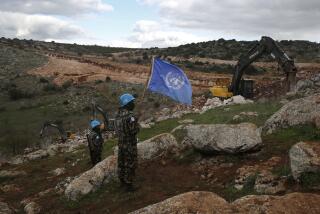U.N. Monitors in Croatia Face Formidable Mission
- Share via
PAKRAC, Croatia — In war zones like this central Croatian city, blasted to ruins by months of battle, U.N. truce monitors who began arriving on Tuesday face a nearly impossible mission to restore peace.
Despite a cease-fire that officials contend has been holding for 11 days, two local civilians were killed, two Croatian national guardsmen were wounded and two others were missing and believed kidnaped after an overnight battle.
The assault occurred while hundreds of Croatian national guardsmen were patrolling this riverfront city--and in defiance of promises by the Yugoslav federal army and the Republic of Serbia to abide by the U.N.-brokered cease-fire that took effect Jan. 3.
The sneak attack by unknown assailants scuttled a prisoner exchange set for Tuesday and added one more threat of renewed artillery battles in the eastern Croatian breadbasket that has been one of the deadliest battlegrounds in the six-month-old Yugoslav war.
But it seems unlikely that the latest outburst would seriously endanger plans for U.N. intervention. Both Serbs and Croats now seem to be counting on the foreign troops to settle their age-old differences and impose peace.
The incident in Pakrac on Monday night and other cease-fire violations have simply highlighted the daunting task that the United Nations faces with its first-ever peacekeeping deployment in Europe, one aimed at ending a battle the Balkan combatants are still itching to fight.
Even since the cease-fire began, at least a dozen people have been killed, explosions have rocked both Croatia and Bosnia-Herzegovina and European Community truce monitors have been fired on as recently as Monday.
The incidents have usually flared out of sight of the 200 or so EC observers already deployed in Croatia, making it difficult to determine after-the-fact which side was guilty of starting the shooting.
“The army doesn’t have control of the Chetniks,” said Vladimir Valenta, regional commander of Croatian forces, referring to Serbian guerrillas he blamed for slaying two of the few civilians still braving life in this rubble-strewn city.
Most of the 12,000 residents of Pakrac have been driven from their homes by the fighting that has destroyed so many houses and apartment buildings that the streets are carpeted with broken glass and pulverized roof tiles. The shallow Pakra River is littered with debris from the bombings, from overturned cars to a pink toilet seat and a department store mannequin.
“They know that the (U.N.) blue helmets will come soon, but they don’t care. The only power they recognize is their own,” Radovan Stepanovic, one of the Croatian fighters defending Pakrac, said of the Serbian guerrillas. “This war will never end because they’ve been preparing for it for over 40 years.”
Army officers say the same about Croats, accusing the breakaway republic’s guardsmen of using the current cease-fire to move in and take back territory while the Serbian-led federal forces are idled by the truce.
The Tanjug news agency, speaking for the army, blamed Croatian guardsmen for provoking a battle Sunday, in which two federal soldiers and three Croats were killed.
With a 350-mile-long front line, where battles flare with little warning and subside just as quickly, an unarmed advance party of 50 U.N. peacekeepers is expected to have little influence in deterring sporadic violence.
The monitors, who arrived in Belgrade and Zagreb on Tuesday, will divide themselves among 11 trouble spots in Croatia, Serbia and Bosnia-Herzegovina to assess whether the cease-fire is holding well enough to begin deploying up to 10,000 U.N. troops.
Some Western diplomats fear that the U.N. deployment, as now envisaged, may not only be ineffective, but dangerous. U.N. soldiers could be called upon to settle rival claims over homes and property that have been at the center of Serb-Croat tensions for decades, and in some cases, centuries.
Both the Croatian and Serbian presidents have called for foreign intervention to stop the war. But both are counting on the U.N. deployment to serve their long-range objectives of securing territory.
About one-third of Croatia has been conquered by the army and occupied by Serbs. Some of the seized territory has been home to Serbs since the 17th Century, when those fleeing Ottoman rule over Serbia were given land in what is today Croatia in return for defending what was then the Austro-Hungarian empire.
More to Read
Sign up for Essential California
The most important California stories and recommendations in your inbox every morning.
You may occasionally receive promotional content from the Los Angeles Times.











